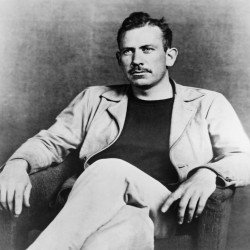
John Steinbeck
American Writer and Novelist
| Date of Birth | : | 27 Feb, 1902 |
| Date of Death | : | 20 Dec, 1968 |
| Place of Birth | : | Salinas, California, United States |
| Profession | : | Novelist, Writer, Journalist |
| Nationality | : | American |
John Ernst Steinbeck was an American writer. He won the 1962 Nobel Prize in Literature "for his realistic and imaginative writings, combining as they do sympathetic humor and keen social perception". He has been called "a giant of American letters.
Biography
Steinbeck attended Stanford University, Stanford, California, intermittently between 1920 and 1926 but did not take a degree. Before his books attained success, he spent considerable time supporting himself as a manual labourer while writing, and his experiences lent authenticity to his depictions of the lives of the workers in his stories. He spent much of his life in Monterey county, California, which later was the setting of some of his fiction.
Steinbeck’s first novel, Cup of Gold (1929), was followed by The Pastures of Heaven (1932) and To a God Unknown (1933), none of which were successful. He first achieved popularity with Tortilla Flat (1935), an affectionately told story of Mexican Americans. The mood of gentle humour turned to one of unrelenting grimness in his next novel, In Dubious Battle (1936), a classic account of a strike by agricultural labourers and a pair of Marxist labour organizers who engineer it. The novella Of Mice and Men (1937), which also appeared in play and film versions, is a tragic story about the strange, complex bond between two migrant labourers. The Grapes of Wrath won a Pulitzer Prize and a National Book Award and was made into a notable film in 1940. The novel is about the migration of a dispossessed family from the Oklahoma Dust Bowl to California and describes their subsequent exploitation by a ruthless system of agricultural economics.
After the best-selling success of The Grapes of Wrath, Steinbeck went to Mexico to collect marine life with the freelance biologist Edward F. Ricketts, and the two men collaborated in writing Sea of Cortez (1941), a study of the fauna of the Gulf of California. During World War II Steinbeck wrote some effective pieces of government propaganda, among them The Moon Is Down (1942), a novel of Norwegians under the Nazis, and he also served as a war correspondent. His immediate postwar work—Cannery Row (1945), The Pearl (1947), and The Wayward Bus (1947)—contained the familiar elements of his social criticism but were more relaxed in approach and sentimental in tone.
Steinbeck’s later writings—which include Travels with Charley: In Search of America (1962), about Steinbeck’s experiences as he drove across the United States—were interspersed with three conscientious attempts to reassert his stature as a major novelist: Burning Bright (1950), East of Eden (1952), and The Winter of Our Discontent (1961). In critical opinion, none equaled his earlier achievement. East of Eden, an ambitious epic about the moral relations between a California farmer and his two sons, was made into a film in 1955. Steinbeck himself wrote the scripts for the film versions of his stories The Pearl (1948) and The Red Pony (1949). Outstanding among the scripts he wrote directly for motion pictures were Forgotten Village (1941) and Viva Zapata! (1952).
Steinbeck’s reputation rests mostly on the naturalistic novels with proletarian themes he wrote in the 1930s; it is in these works that his building of rich symbolic structures and his attempts at conveying mythopoeic and archetypal qualities in his characters are most effective.
Quotes
Total 20 Quotes
Books are the best friends you can have; they inform you, and entertain you, and they don't talk back.
The fields were fruitful, and starving men moved on the roads.
If you want to destroy a nation, give it too much - make it greedy, miserable and sick.
And now that you don't have to be perfect, you can be good.
If you understand each other you will be kind to each other.
There are several kinds of love. One is a selfish, mean, grasping, egotistical thing which uses love for self-importance. This is the ugly and crippling kind. The other is an outpouring of everything good in you — of kindness and consideration and respect — not only the social respect of manners but the greater respect which is recognition of another person as unique and valuable. The first kind can make you sick and small and weak but the second can release in you strength, and courage and goodness and even wisdom you didn’t know you had.
If you find yourself in a fair fight, your tactics suck.
People are felt rather than seen after the first few moments.
I believe a strong woman may be stronger than a man, particularly if she happens to have love in her heart. I guess a loving woman is indestructible.
Don't worry about losing. If it is right, it happens - The main thing is not to hurry. Nothing good gets away.
